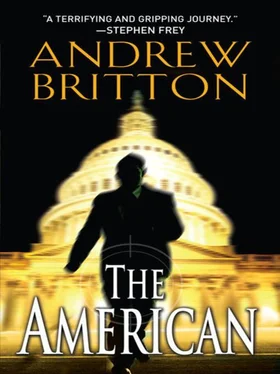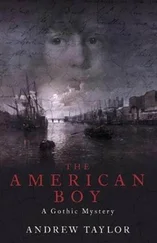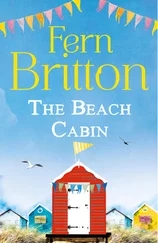Andrew Britton - The American
Здесь есть возможность читать онлайн «Andrew Britton - The American» весь текст электронной книги совершенно бесплатно (целиком полную версию без сокращений). В некоторых случаях можно слушать аудио, скачать через торрент в формате fb2 и присутствует краткое содержание. Жанр: Триллер, на английском языке. Описание произведения, (предисловие) а так же отзывы посетителей доступны на портале библиотеки ЛибКат.
- Название:The American
- Автор:
- Жанр:
- Год:неизвестен
- ISBN:нет данных
- Рейтинг книги:3 / 5. Голосов: 1
-
Избранное:Добавить в избранное
- Отзывы:
-
Ваша оценка:
- 60
- 1
- 2
- 3
- 4
- 5
The American: краткое содержание, описание и аннотация
Предлагаем к чтению аннотацию, описание, краткое содержание или предисловие (зависит от того, что написал сам автор книги «The American»). Если вы не нашли необходимую информацию о книге — напишите в комментариях, мы постараемся отыскать её.
The American — читать онлайн бесплатно полную книгу (весь текст) целиком
Ниже представлен текст книги, разбитый по страницам. Система сохранения места последней прочитанной страницы, позволяет с удобством читать онлайн бесплатно книгу «The American», без необходимости каждый раз заново искать на чём Вы остановились. Поставьте закладку, и сможете в любой момент перейти на страницу, на которой закончили чтение.
Интервал:
Закладка:
Ryan settled back a few inches in his chair. Finally, we come to it.
“William Paulin was the second child of Francis and Julienne Vanderveen. Their first, Madeline Jane, was born in 1961. As the general was gone the majority of the time, the children lived with their mother on the family estate in Piet Retief, a small town in the Assegai Valley. By all accounts, Julienne was a very beautiful woman, and wholly devoted to her children.” Martins hesitated. “What follows is largely conjecture, but as I said, we had a difficult time finding reliable witnesses.
“You’ve already seen the transcripts. William scored 184 on the Stanford-Binet when he was eleven years old. He also scored off the charts on the Weschler Scales and the Slosson Intelligence Test for Children. His brilliance was undeniable, but his sister was another matter entirely. She was better known for her… well, for her promiscuous behavior. In 1975, it was widely rumored in the village that she was seeing one of the Africans working a nearby farm. A young man in his early twenties.”
Naomi did the math quickly. “She was fourteen?”
Martins nodded. “It didn’t last long, though. Madeline died that same year. Apparently, she suffered a fatal fall in the mountains surrounding her home.”
Kealey thought he saw where this was going. “The general?”
But Martins shook his head. “No. He would have had ample motive if the rumors were true, of course, but Francis Vanderveen was 100 kilometers away on the day his daughter died, supervising the destruction of an entire village in the Natal. He was not responsible.”
A brief silence ensued. “Surely you’re not suggesting that William-”
The ambassador held up a hand to stop Naomi. “I’m just giving you the facts.”
“But he was so young,” Kharmai protested. “It doesn’t seem… right, somehow.”
“There’s nothing right about it,” Martins agreed. “But the story doesn’t end there. A month after the girl was buried, the young man she had been seeing went missing from the farm he was working. They found him a week later in the first hills leading out of the Assegai. The body was virtually cut to pieces.”
“And the girl’s father?” Ryan inquired.
“Was 1,100 kilometers away at the time, supervising a troop buildup on the Angolan border.”
Another silence, longer this time. “Needless to say, Julienne was devastated by the loss of her only daughter, but I’ll get back to that in a moment.”
The ambassador shifted his weight in the seat and flipped through the file he had been given earlier in the day. “Francis Vanderveen was promoted to major general in the spring of 1975, four months before Madeline’s death. Up until this time, South Africa’s white population was protected from hostile African lands by a ring of buffer states that fell under Afrikaner control. Two of those states were Mozambique and Angola, both of which were governed in the early 1970s by Portugal.
“In 1974, economic instability led to a military coup in Lisbon. This effectively cut off all funds to Portugal’s foreign interests, including the army. When the Portuguese commanders in both colonies realized that they were about to lose control of the coastal territories, they agreed to set dates for independence: June of 1975 for Mozambique and November of that same year for Angola.”
“Sir, what does this have to do with Francis Vanderveen?” Kealey asked.
“Hold on, I’m getting to that. Some level of authority over these two states was deemed necessary at the top levels of the South African government. After all, their very vision of a white South Africa was at stake. An agreement was quickly reached between the prime minister, John Vorster, and Samora Machel, the rebel leader in Mozambique. Angola was less receptive to the South African proposals, so the land was up for grabs. There were three main parties vying for control of the territory: the rebel-led MPLA, which was backed by the Soviet Union and the Cubans; the FNLA, headed by Holden Roberto and supported primarily by the United States; and UNITA, a centrist organization under the control of a Swiss-educated lawyer named Savimbi.”
Naomi was visibly surprised. “I thought the U.S. government was pretty adamant in its criticism of apartheid. Why would Washington intervene?”
“From our point of view, the South Africans were the lesser of two evils,” the ambassador explained. “The MPLA was well funded by two Communist governments, and there was a good chance they were going to come out on top. We wanted to limit Communist exposure on the African continent, and to do that, we were forced to deal. But it wasn’t actually Washington that stepped in. I’ll explain in a moment.
“Anyway, once Vorster decided to invade, he was offered support by both the French and the Americans. In late 1974, the French government organized a meeting between Savimbi’s UNITA and the South African Bureau for State Security. Francis Vanderveen was one of the first officials invited. Once in Paris, he accused the French foreign minister of trying to ride his army’s coattails into Cabinda, which is an oil-rich enclave of Angola. He was right, of course, but he ruined any potential alliance with the French.”
“So he was stuck with us,” Ryan offered.
“Exactly,” Martins agreed. “And it didn’t seem like such a bad deal at first. The CIA had purchased radio stations and newspapers to run propaganda against the MPLA. The Agency certainly seemed to be doing its part. Vanderveen was selected to lead the invasion force. The prize, of course, was the capital, Luanda. His armored column crossed into Angola on the 23rd of October 1975, and he easily won the first battles at Sa da Bandiera and Namibe, encountering almost no resistance at all. As his forces pushed north toward Benguela, though, things began to change.”
Ambassador Martins stood up and moved to his desk. Unlocking one of the drawers, he came back to the seating area with a small tin box in his hands. Placing it gently on the coffee table, he took his seat once again.
“After our meeting this morning, my people began tracking down William Vanderveen’s surviving relatives. Only one could be found on his father’s side: Deborah Poole, nee Vanderveen, the general’s sister. She’s well on in years now, but she was more than willing to talk with the young man who came out to interview her. And she gave him this.”
The ambassador produced a small silver key and unlocked the box. Then he turned it so that Naomi and Ryan could see the contents.
Kealey leaned forward and picked up the first document. After unfolding the stained, torn paper, he began to read.
My Dearest Julienne,
We are now entrenched in a muddy field outside Novo Redondo. What you would see, if you were here, would not resemble much of an army at all. We have almost no ammunition or fuel due to our waffling politicians. The men are down to one meal a day, and lucky to get that. In all my years as a soldier, I have never felt as unappreciated as I do now.
A man from the American CIA came to look at our maps and give us his educated opinion. I told him that we needed supplies more than anything else, and he laughed in my face. I was told that it is a lost cause, that reclaiming Angola is no longer “politically expedient.” I said that he would feel differently if he had fought over hundreds of kilometers to protect his country.
Julie, I would say this only to you, but I think that we must have them if we are to reach Luanda. It is more than physical supplies: Vorster needs the U.S. after the war as well, and he can’t afford for this campaign to go on. If the Americans were to give him their full support, we would have victory and I would be back at home, where I belong.
Читать дальшеИнтервал:
Закладка:
Похожие книги на «The American»
Представляем Вашему вниманию похожие книги на «The American» списком для выбора. Мы отобрали схожую по названию и смыслу литературу в надежде предоставить читателям больше вариантов отыскать новые, интересные, ещё непрочитанные произведения.
Обсуждение, отзывы о книге «The American» и просто собственные мнения читателей. Оставьте ваши комментарии, напишите, что Вы думаете о произведении, его смысле или главных героях. Укажите что конкретно понравилось, а что нет, и почему Вы так считаете.












